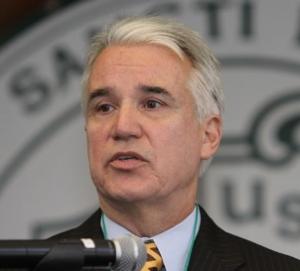Ending prohibition is only phase one.
The drug has the potential to be tremendously disruptive of the traditional illicit drug market and smuggling structures.
Trumps's Justice Department makes it possible.
An amendment protecting medical marijuana in states where it is legal has made it into the House's Justice Department appropriations bill, Illinois legislators approve medical marijuana in schools, the Utah initiative campaign is turning into a pitched battle, and more.
A Border Patrol agent goes to prison for helping pot smugglers, an NYPD cop gets nailed for agreeing to transport drugs for cash, a Florida crime scene tech gets busted stealing drugs from dead people, and more.
There's good and bad news on hemp today, a new Rhode Island marijuana legalization bill is filed, San Antonio moves toward the first legal needle exchange in Texas, and more.
Michigan legalization initiative foes urge the legislature to legalize it, an Ohio legalization initiative can begin signature gathering, a federal drug treatment bill exclusively targeting opioids advances, and more.
There's too much weed in Oregon, Utah medical marijuana foes try another tack to block the initiative, Africa gets its first medical marijuana dispensary, and more.
New York Mayor Bill de Blasio wants to see an end to public pot smoking arrests, Utah medical marijuana supporters are fending off a court challenge, the "Philippine disease" appears to be spreading to Bangladesh, Afganistan sees a bumper poppy crop, and more.
A solid majority of New Mexicans support marijuana legalization, the House passes a limited prison -- but not sentencing -- reform bill, an Open Society Foundations report calling for increased opportunities for legal coca sales in Colombia, and more.
special to Drug War Chronicle by Houston-based investigative journalist Clarence Walker, [email protected]
As marijuana legalization spreads into various states, some are allowing people who'd been previously been convicted of possession of a small amount of pot to clear their records.

Marijuana is now legal in nine states, but what about those old convictions? (IRIN News)
They have their convictions either wiped off their record forever under state expungement laws or, in some cases, have low-level felony marijuana convictions be reduced to misdemeanors. In another variation, a marijuana conviction can be sealed from public view pursuant to a court order under a state's nondisclosure law.
According to the Drug Policy Alliance, over 574,000 American citizens were charged with simple possession in 2016.
"It really makes sense to not burden these people with a lifelong criminal record," Kate Bell, a lobbyist for the Marijuana Policy Project in Maryland, recently told the Washington Post.
Approximately 12 more states are considering marijuana legalization this year, with possibly more hopping on the express train as the continuing quest for marijuana legalization continue to roll down the tracks at full speed, making 2018 a pivotal year in the ever-growing movement to convince lawmakers to legalize pot in all 50 states.
"With over 60 percent of Americans now supporting the full legalization of marijuana for adults, the momentum behind marijuana law reform will not only continue but increase as we head into 2018," said NORML executive director Erik Altieri.

Seattle Mayor Jennie Durkan (D) has moved to clear old records.(Wikimedia)
People with prior marijuana convictions face a harsh reality when it comes to becoming a productive member of society with a criminal record. A simple marijuana conviction carries adverse consequences by diminishing a person's access to employment and higher education, military induction denial, and a person can even be denied access to fair housing, particularly apartment rentals.
Recently at least 4,900 Californians petitioned the courts to have their prior marijuana convictions expunged off their criminal record.
Washington state legalized marijuana in 2012, yet many convicted citizens have been burdened with criminal records for simple misdemeanor pot convictions while slick wealthy investors make a killing selling legal weed. Moving to redress the injustice, Seattle Mayor Jenny Durkan announced in February that the city will toss several hundred low-level misdemeanor marijuana cases.
"The war on drugs ended up being a war on people who needed help, who needed opportunity and who needed treatment," Durkan told a news conference at the time.
Similarly, prosecutors in San Francisco will throw out thousands of marijuana-related convictions dating back to 1975. San Francisco District Attorney George Gascon said earlier this year his office will dismiss and seal 3,038 misdemeanor convictions from before the state's legalization of marijuana went into effect, with no action necessary from those convicted.
The moves make perfect sense. What else should happen to convictions for a victimless crime when that victimless behavior is now no longer a crime? American University Law Professor Jenny Roberts has an idea.
"If you've made a legislative determination that this is no longer criminal; why would you want to continue to have people feeling the ramifications of something that people going forward will no longer have to suffer?" she asked.

And so has San Francisco DA George Gascon. (Wikimedia)
In many states that have legalized marijuana, lawmakers are moving in the same direction.
"Since this is now the law of Nevada, it's important we allow folks who have made these mistakes in the past to have their records sealed up," said Nevada Assemblyman William McCurdy, a Democrat who proposed a bill on the issue.
Oregon state law now allows people who'd been convicted of an ounce of marijuana or growing up to six marijuana plants to have their record sealed now that marijuana is legal.
But in Colorado, some lawmakers fought against the proposal. For example, the legislature considered a bill in 2014 to allow citizens to petition the courts to seal their criminal records for old convictions, but the bill died in committee after facing stiff opposition from prosecutors. The Colorado District Attorneys Council opposed the bill because, they argued, it allowed low-level drug dealers to wipe their records clean.
"There were many cases of (drug) distribution that were pleaded down to low-level (possession) felonies," said council executive director Thomas Raynes.
"The bill creates a horrible precedent by retrofitting criminal sanctions for past conduct every time a new law is changed or passed," objected Carolyn Tyler, spokeswoman for Republican Attorney General John Suthers.
This year, Colorado passed a less controversial law focused specifically on misdemeanor possession.
Nevada also suffered a mild setback. Governor Brian Sandoval (R) vetoed McCurdy's bill requiring judges to seal records and vacate judgments for marijuana offenses that are now legal.
"To the extent there are individuals suffering under criminal records for conduct now legal in Nevada, those cases are best handled on a case-by-case basis," Sandoval wrote in his veto statement. "Given other reforms to the sealing and expungement process in Nevada, a marijuana-specific law wasn't necessary," Sandoval added.
Although nearly a million people have been arrested for marijuana crimes in California during the past decade, according to Drug Policy Alliance, California courts only received 1,506 petitions from applicants requesting their marijuana conviction be sealed or expunged.
DPA further reported that more than 78,000 convictions qualify to be set aside in Oregon, yet few are seeking expungement. Oregon courts only received approximately 388 requests for set-asides in cases involving marijuana in 2015, with 453 in 2016, and 365 requests in 2017.
Courts are more likely, though, to reject petitioners with extensive criminal histories including violent crimes like murder, kidnapping, sexual assaults, money laundering and crimes involving large amount of drugs.
Marijuana is now legal in nine states and the District of Columbia, and medical marijuana in 29 states. The following states are preparing marijuana offense expungement legislation:
California
Assembly Bill 1793, introduced by Assemblyman Rob Bonta (D-18th District), seeks to enact legislation that would allow the "automatic expungement or reduction of a prior cannabis conviction for an act that is not a crime as of January 1, 2017." Under Proposition 64, residents of California are now allowed to possess and purchase up to 1 ounce of marijuana and cultivate no more than six plants for personal use. The voter-approved measure, in addition to legalizing adult-use consumption, cultivation, and distribution -- allows individuals convicted of past criminal marijuana possessions to petition the courts to have those convictions expunged. An expensive and time-consuming venture for most individuals, the automatic expungement of records would be mandated by the passage AB-1793.
Massachusetts
H.2785, authored by Rep. Aaron Vega (D-5th District), and cosigned by 25 other elected officials, would allow for the expungement of "records of marijuana arrest, detention, conviction and incarceration." Marijuana use in Massachusetts was first decriminalized in 2008, with the voters approving medical marijuana just four years later in November 2012. Officially legalized for adult use on Nov. 8, 2016, residents are still waiting for their first recreational dispensary to open.
New Jersey
S.830, sponsored by Sen. Nicholas Scutari (D-22nd District), would not only legalize the personal possession and use of small amounts of marijuana by those over the age of 21, the bill also allows a person convicted of a prior marijuana possession to present an application for expungement to the state's Superior Court.
Vermont
H.865, sponsored by Maxine Grad (D), Tom Burditt (R), Chip Conquest (D), would allow a person to file a petition with the court requesting expungement or sealing of the criminal history related to a conviction if "the person was convicted of an underlying offense for which the underlying conduct is no longer prohibited by law or designated as a criminal offense."
back to top
The synthetic opioid fentanyl isn't just killing American drug users by the thousands. Its emergence also signals a shift in the decades-old contours of the global drug trade, with ramifications not only for traditional drug-producing countries and drug trafficking networks but also for US foreign policy.

Black market fentanyl is not just wreaking havoc on the streets of American cities. (Creative Commons)
Synthesized from chemicals -- not from
papaver somniferum, the opium poppy --
fentanyl is about 50 times stronger than heroin and is severely implicated in the country's drug overdose crisis, accounting for
almost 20,000 deaths in 2016.
Illicit fentanyl is typically mixed with other opiates, such as heroin, resulting in much stronger doses of opioids than users expect, thus leading to opioid overdoses. But it is also increasingly also showing up in non-opiate drugs, resulting in fentanyl overdose deaths among unsuspecting methamphetamine and cocaine users.
But the havoc super-potent fentanyl is wreaking among drug users pales in comparison with the dramatic changes it could prompt in the global illicit drug production industry. As academic researchers Vanda Felbab-Brown, Jonathan Caulkins, and Keith Humphreys write in the current issue of Foreign Affairs, fentanyl's rise has the potential to cause disruption and innovation in black markets.
Here are four ways fentanyl alters the illegal drug production and distribution status quo:
1. It doesn't require an agricultural base. Virtually all of the other opioids on the black market, from heroin to morphine, oxycodone, and hydrocodone, require land to grow poppies on. And they require land that is outside cdthe effective control of the state. Non-state actors who can control such areas, whether it's the Taliban in Afghanistan or the drug cartels in southern and western Mexico, reap the profits and power of that control. With the ascent of lab-produced fentanyl made out of chemicals, traditional opiate producers should see their profits and their influence undermined.
2. It doesn't require a large workforce. Traditional opium production requires a large seasonal workforce of people to plant and tend the poppies, score the pods and scrape off the leaking opium, and then process and package the raw opium. Other workers will get jobs processing raw opium into heroin. All of those jobs bring money into the hands of poor agricultural families and political capital to the traffickers, whether it's the Taliban in Afghanistan or the cartels in Mexico. With fewer job opportunities to offer up, the traffickers lose clout.
3. It doesn't require an elaborate smuggling infrastructure. Because fentanyl is so potent, small amounts of the drug can contain huge numbers of doses, and that means it doesn't require transportation networks of trucks, planes, and boats to get an agricultural crop from the valleys of Afghanistan or the mountains of Mexico to consumers in the US Fentanyl is so potent, medicinal doses are measured in micrograms, and packages of it worth hundreds of thousands of dollars can fit inside a Priority Mail envelope. With smuggling fentanyl as easy as dropping a package in the mail, international drug smuggling organizations now have competition they never had before.
4. All of this can change the dynamics of US foreign policy. If plant-based opiates lose market share to synthetics in the future, this can weaken both insurgencies (Afghanistan) and criminal networks (Mexico). Ever since the US invasion of Afghanistan in 2001, drug warriors have been constrained in their efforts to go after the Afghan opium crops because of fears it would drive poppy-dependent peasants into the hands of the Taliban. If opium production becomes relatively less important vis-Ã -vis fentanyl production, that constraint on an aggressive US response to Afghan opium production is weakened. Similarly, in Mexico, to the degree that fentanyl displaces peasants and processors and weakens the link between drug cartels and rural populations, it increases the ability of the Mexican government and its American backers to crack down even harder on the cartels.
Under drug prohibition, there is a strong impetus to come up with more pure, more potent, and more compact products. Fentanyl is the ultimate expression of that imperative, and its arrival is changing the contours of the global drug industry. Who knows how it will play out?
back to top
Responding to myriad tales of abuses, like many other states, Missouri has reformed its asset forfeiture laws to require a criminal conviction before cash or property is seized and, in a bid to prevent "policing for profit," to require that money seized by state law enforcement agencies goes solely to the state's schools.

Under Missouri law, seized cash is supposed to go to the schools, but the cops have found an end-around. (Wikipedia)
Somebody needs to tell the cops. As
Kansas City TV station KMBC reported, state and local law enforcement agencies seized more than $19 million in the past three years, but only some $340,000 has actually made it to the schools. That's a measly 2% of the cash seized.
That's because police, with the help of the Trump Justice Department, are doing an end run around the state law. Under the Justice Department's Equitable Sharing Program, which was suspended late in the Obama administration but reinstated last year by Attorney General Jeff Sessions, state and local law enforcement agencies can hand their cash-laden cases over to federal prosecutors instead of turning them in to local district attorneys. And when they do, the reporting agency gets to keep 80% of the seized cash, with the Justice Department getting the rest.
The scheme not only subverts state law by diverting much-needed funding for schools to police agencies, but also by allowing state and local cops to seize cash and goods under the federal law, which does not require a criminal conviction first. In this manner, Missouri's cops are not only ripping off the schools, they are also giving a big middle finger to the state's democratically elected representatives who passed the asset forfeiture reform law.
The cops like things just as they are.
"We can immediately put that back in our tool belt if you will," said Major Derek McCollum, the head of the Kansas City Police Department's Asset Forfeiture Squad. The money buys "computer type equipment, covert surveillance type equipment," McCollum told KMBC, adding that he didn't feel like law enforcement was taking money from the schools.
The Missouri School Board Association begs to differ.
"Absolutely, the constitution says it is," said association attorney Susan Goldammer of the forfeiture money. "We still have school districts that don't have air conditioning or have concerns about asbestos. We've got many, many school buildings in the state that are way more than 100 years old," she added.
Instead of turning forfeitures over to the state's school system, the state Highway Patrol spent $70,000 on new weapons. And in Phelps County, which sits astride the east-west throughway Interstate 44 and which profited the most from asset forfeiture, the sheriff spends the money on the department's buildings -- not school buildings.
State Rep. Shamed Dogan (R-St. Louis) is working on a partial fix. He has authored House Bill 1501, under which only cases involving more than $50,000 could be handed over to the feds. (He had originally pegged the figure at $100,000, but has now halved it after "pushback from law enforcement.")
Dogan told KMBC that cases over $50,000 account for about 20% of asset forfeiture cases statewide and that he believes many smaller seizures are from innocent victims or involve rights violations.
"We can eliminate that incentive for them to just take money or take property," Dogan said. "The government seizes their money and says, "we think you're a suspected drug dealer. The government never produces any drugs, never charges you with a crime and then you have to spend more than they've actually seized trying to get your property back. That's unfair."
The $100,000 version of Dogan's bill is currently stalled in the legislature. Facing law enforcement opposition, the House Crime Prevention and Public Safety Committee voted in February to postpone action on it, and the bill has no hearings scheduled and is not on the House calendar.
Perhaps he can get the $50,000 version moving. In the meantime, Missouri's cops continue to perversely profit from prohibition, while the state's schools are out of luck.
back to top
An amendment protecting medical marijuana in states where it is legal has made it into the House's Justice Department appropriations bill, Illinois legislators approve medical marijuana in schools, the Utah initiative campaign is turning into a pitched battle, and more.
NationalLast Thursday, a House panel approved medical marijuana protections. The House Appropriations Committee approved an amendment from Rep. David Joyce (R-OH) to continue to protect state-legal medical marijuana programs from federal interference. The amendment is now part of the House's Commerce, Justice and Science appropriations bill. The amendment, previously known as the Rohrabacher-Blumenauer amendment, bars the expenditure of federal funds to go after state-legal medical marijuana.
Illinois
Last Thursday, the legislature approved medical marijuana in schools. The Senate on Thursday approved a bill that would allow for the use of medical marijuana in elementary and middle schools. The bill has already passed the House and now goes to the desk of Gov. Bruce Rauner (R). The bill would let parents administer marijuana-infused products, but not smoked marijuana, to their child on school grounds.
Missouri
Last Friday, a medical marijuana bill died. A medical marijuana bill, House Bill 1554, has died in conference committee, leaving the path open for at least one medical marijuana initiative to go before the voters in November. The bill came as an amendment to a healthcare bill and would only have allowed patients with terminal illnesses to use non-smokable marijuana.
Utah
Last Thursday, medical marijuana foes sued to block the initiative from going to the voters. Drug Safe Utah, a group formed to oppose the medical marijuana initiative, went to court to try to block it. In court filings, the group argued that the lieutenant governor, whose office oversees elections, doesn't have the authority to allow campaigners to gather signatures. Drug Safe Utah argued that state officials couldn't act on the initiative because it "conflicts with federal law."
On Monday, medical marijuana initiative supporters fought back in court. Supporters of the medical marijuana initiative showed up in court to intervene in a lawsuit that seeks to prevent the initiative from going before the voters in November. The Utah Patients Coalition is seeking to block a lawsuit from Drug Safe Utah that argues state officials were not legally allowed to approve the initiative.
West Virginia
On Monday, lawmakers were working to force a special session to deal with medical marijuana financing. Some state lawmakers are seeking to force Gov. Jim Justice (D) to call a legislative special session to address financial problems with the state's medical marijuana law. A special session that ended Monday failed to address the issue. For another special session to be called, at least three-fifths of each chamber must sign on. That figure has been met in the Senate, but not yet in the House.
On Tuesday, they came up short. The legislature concluded its may interim meetings Tuesday without securing enough signatures in the House of Delegates to force a special session to address marijuana banking issues. The legislature needed three-fifths of members in both the Senate and the House to force a special session. Enough senators signed on to meet that bar, but not enough delegates did.
[For extensive information about the medical marijuana debate, presented in a neutral format, visit MedicalMarijuana.ProCon.org.]
back to top
A Border Patrol agent goes to prison for helping pot smugglers, an NYPD cop gets nailed for agreeing to transport drugs for cash, a Florida crime scene tech gets busted stealing drugs from dead people, and more. Let's get to it:
In Lawrenceville, Georgia,
a Gwinnett County sheriff's deputy resigned last Friday as investigators began questioning him about two kilograms of cocaine that were seized but never showed up as evidence. Deputy Antoine Riggins is a 14-year veteran and had been a member of a federal drug task force. In one case, three kilos of cocaine were seized, but only one was checked into evidence. He is also a suspect in two other cases of seized drugs that vanished. Criminal charges are expected in coming days.
In Pensacola, Florida, an Escambia County sheriff's crime scene technician was arrested last Friday for allegedly stealing drugs from dead people. Tech Christine Rollins, 41, went down after an internal investigation. She was charged with trafficking hydrocodone, trafficking oxycodone, petty theft, and possession of a controlled substance without a prescription.
In New York City, an NYPD officer was convicted last Thursday of transporting marijuana and cocaine for someone she thought was a drug dealer, but was actually an undercover officer. Nysia Stroud, 30, was assigned to the NYPD Fleet Services Division. She went down after agreeing to transport the contraband and was paid $1,000 each time she did so. She was found guilty of criminal possession of a controlled substance and official misconduct. Sentencing is set for June 4.
In Tucson, Arizona, a former Border Patrol officer was sentenced Monday to seven and a half years in federal prison for helping to smuggle marijuana into the country. Former agent Alberto Michel, 41, a nine-year veteran, admitted providing counter-surveillance assistance to smugglers, using the information he obtained as a member of the Intelligence Unit. In return, he would be paid $40 per pound of marijuana. He admitted receiving payments totaling $12,000. Michel was originally charged with six counts but ended up copping a plea to just two: conspiracy to possess with intent to distribute marijuana and a public official accepting a bribe.
back to top
There's good and bad news on hemp today, a new Rhode Island marijuana legalization bill is filed, San Antonio moves toward the first legal needle exchange in Texas, and more.

Hemp fields are starting to pop up. (Vote Hemp)
Rhode Island Marijuana Legalization Bill Introduced. Sen. Joshua Miller (D-Providence) Thursday filed a bill to tax and regulate marijuana. He's been introducing similar bills since 2014. The bill would tax pot at 10% in addition to the state's 7% sales tax, as well as allowing up to another 3% in local taxes. Adults could possess up to an ounce and grow up to two plants. The bill is not yet available on the legislative web site.
Hemp
House Republicans Block Votes on Hemp Amendments. The House Republican leadership has blocked several proposed industrial hemp amendments from being considered on the House floor. Proponents had hoped to add the amendments to the farm bill now under consideration, but the House Rules Committee put the kibosh on that. Chairman Rep. Pete Sessions (R-TX) has a reputation for blocking marijuana-related measures, and he just upheld it again.
Arizona Governor Signs Hemp Bill. Gov. Doug Ducey (R) has signed into law Senate Bill 1098, which will create a state pilot program allowing the study and cultivation of industrial hemp. Growing, processing, and transporting hemp will require permits from the state Department of Agriculture.
Indiana Lawmakers Will Study Hemp -- Not Medical Marijuana -- This Summer. An interim legislative committee will spend the summer considering the legalization of hemp, but the panel "will not look into issues related to medical marijuana."
Harm Reduction
Ithaca Mayor Calls on New York Governor to Approve Safe Injection SitesThere. Mayor Svante Myrick (D) has asked Gov. Andrew Cuomo (D) to approve a safe injection site in Ithaca. The move comes after New York City announced a plan for four safe injection sites there. "The overdose crisis is statewide and the pilot intervention should be too," Myrick wrote to Cuomo. "This epidemic is also a rural epidemic and our solutions will need to address that reality. Start with Ithaca." The Ithaca Municipal Drug Policy Committee recommended in February 2016 that a supervised consumption pilot program should be implemented in Ithaca.
San Antonio Could Become First Legal Needle Exchange Site in Texas. A decade after a local prosecutor arrested three volunteers for a clean needle program, city officials are set to sing a different tune. Next week, city and county officials, health care providers, drug treatment providers, law enforcement, and nonprofits will meet to discuss how to make San Antonio the first city in the state to have a legal needle exchange program. Stay tuned.
Law Enforcement
Justice Department to Add More Than 300 New Prosecutors. DOJ announced Thursday that it is creating 311 new assistant US attorney positions, the largest increase in prosecutors in decades. More than half will focus on violent crime, 86 on civil enforcement, and 35 on immigration-related crime. Most of the new positions in civil enforcement will be focused on his department's newly created task force targeting opioids. "Under President Trump's strong leadership, the Department of Justice is going on offense against violent crime, illegal immigration, and the opioid crisis -- and today we are sending in reinforcements," Attorney Geneal Sessions said in a statement.
International
Thai Interim Cabinet Approves Medical Marijuana, Decriminalizes Hemp, Kratom, Opium. The interim cabinet has approved a bill that would allow the use of marijuana for medical reasons, as well as decriminalizing the consumption of hemp, kratom, and opium. "The approval of this bill is an important matter," government spokesman Sansern Kaewkamnerd said. "Class 5 narcotics were allowed for cultivation and extraction… but not for consumption, which made it impossible to use them for research on humans. The bill now goes before the interim assembly.
back to top
Michigan legalization initiative foes urge the legislature to legalize it, an Ohio legalization initiative can begin signature gathering, a federal drug treatment bill exclusively targeting opioids advances, and more.
Marijuana PolicyMichigan Legalization Initiative Foes Urge Legislature to Pass Legalization. In a surprise move, a campaign committee formed to oppose the pending marijuana legalization initiative is now asking the legislature to preemptively pass legalization. Keep Pot Out of Neighborhoods and Schools issued a press release Thursday calling on the legislature to approve the initiative. Under state law, the legislature can just pass the initiative, or, if it rejects it or fails to act, the initiative would go before voters in November. State Republicans worry that interest in the initiative will drive turnout at the polls, worsening their chances in the election.
Ohio Legalization Initiative Cleared for Signature Gathering. The state Ballot Board on Thursday cleared a legalization initiative, the Marijuana Rights and Regulation Act, for signature gathering. Campaigners need to come up with some 305,000 valid voter signatures to qualify for the initiative. The deadline to make the November ballot is in July, but campaigners say there are instead aiming at 2019.
Medical Marijuana
House Panel Approves Medical Marijuana Protections. The House Appropriations Committee on Thursday approved an amendment from Rep. David Joyce (R-OH) to continue to protect state-legal medical marijuana programs from federal interference. The amendment is now part of the House's Commerce, Justice and Science appropriations bill. The amendment, previously known as the Rohrabacher-Blumenauer amendment, bars the expenditure of federal funds to go after state-legal medical marijuana.
Illinois Legislature Approves Medical Marijuana in Schools. The Senate on Thursday approved a bill that would allow for the use of medical marijuana in elementary and middle schools. The bill has already passed the House and now goes to the desk of Gov. Bruce Rauner (R). The bill would let parents administer marijuana-infused products, but not smoked marijuana, to their child on school grounds.
Missouri Medical Marijuana Bill Dies. A medical marijuana bill, House Bill 1554, has died in conference committee, leaving the path open for at least one medical marijuana initiative to go before the voters in November. The bill came as an amendment to a healthcare bill and would only have allowed patients with terminal illnesses to use non-smokable marijuana.
Heroin and Prescription Opioids
House Panel Advances Bill to Expand Drug Treatment, But Only for Opioids. The House Committee on Energy and Commerce on Thursday advanced a bill that would free up Medicaid dollars for spending on treatment for opioid addictions, but some lawmakers warned that the country is facing a polydrug crisis. "I'm troubled that this bill would expand treatment only to people with opioid use disorder as opposed to those with other substance use disorders like alcohol, crack-cocaine, methamphetamine," said Rep. Jan Schakowsky (D-IL). "This bill is not only blind to the reality faced by people suffering from substance use disorder but it's also discriminatory." The measure is HR 5797.
back to top
There's too much marijuana in Oregon, Utah medical marijuana foes try another tack to block the initiative, Africa gets its first medical marijuana dispensary, and more.

Price gouging on the opioid overdose reversal drug needs to stop, Democratic House members say. (PA Health Department)
Oregon US Attorney Warns of "Significant Overproduction" of Legal Marijuana, Will Target Diversion. US Attorney Billy Williams said last Friday that the state has a "significant overproduction" problem and that he would prioritize enforcement of overproduction, diversion to other states, and organized crime. The state currently has nearly a million pounds of marijuana buds in inventory, and it's estimated that Oregon's billion dollar a year industry includes about $300 million worth of pot to diverted to the black market.
Pennsylvania State Senator Calls on DAs to Quit Prosecuting Small-Time Pot Cases. One of the Keystone State's leading voices for marijuana law reform, state Sen. Daylin Leach (D), last Friday published an open letter to the state's district attorneys urging them to quit prosecuting pot possession and smoking cases. Leach cited the nine states that have already legalized marijuana and warned, "If people are convicted this year, and legalization occurs next year or the year thereafter, thousands of people will have a stain on their record that will be extremely difficult or impossible to remove."
Medical Marijuana
Utah Medical Marijuana Foes Sue to Block Initiative from Going to Voters. Drug Safe Utah, a group formed to oppose the medical marijuana initiative, went to court last Thursday to try to block it. In court filings, the group argued that the lieutenant governor, whose office oversees elections, doesn't have the authority to allow campaigners to gather signatures. Drug Safe Utah argued that state officials couldn't act on the initiative because it "conflicts with federal law."
Harm Reduction
House Democrats Call on Trump Administration to Lower Naloxone Price. A group of House Democrats led by Reps. Lloyd Doggett (D-TX) and Peter Welch (D-VT) have sent a letter to White House Kellyanne Conway asking for executive action to curb rising prices for naloxone, the opioid overdose reversal drug. "Federal agencies have the authority to use patented inventions… when in the interest of the public good," the lawmakers wrote. "The current opioid crisis requires invoking this provision."
International
German Drug Official Hints at Move Toward Marijuana Decriminalization. In a report released last week, German drug commissioner Marlene Mortler appeared to call for marijuana decriminalization. "Anyone caught by the police in the future for possession of cannabis for personal consumption should be allowed to choose whether to pay a fine or voluntarily seek help from the expert," she said. German drug arrests were up more than 6% last year, while marijuana arrests were up 14%. About 80% of all marijuana cases were for simple possession.
Africa Gets First Medical Marijuana Dispensary. A medical marijuana dispensary has opened in Durban, South Africa, making it the first on the continent. The store is currently only selling products without THC. "We want to break the stigma on cannabis, to showcase that cannabis can be used effectively to treat a number of conditions and to integrate medical professionals as well as traditional healers to allow the whole of South Africa a holistic approach to health care," said dispensary spokesperson Kirithi Thaver.
back to top
New York Mayor Bill de Blasio wants to see an end to public pot smoking arrests, Utah medical marijuana supporters are fending off a court challenge, the "Philippine disease" appears to be spreading to Bangladesh, Afganistan sees a bumper poppy crop, and more.

Afghanistan had its largest opium poppy crop ever last year, the UNODC reports. (UNODC)
Michigan Opposition Marijuana Poll Has Initiative in Lead, But Under 50%. A new poll commissioned by opponents of Michigan's marijuana legalization initiative had it with 48% support, 11% undecided, and 42% opposed. After pollsters produced arguments in favor of the initiative, support stayed at 48%, but opposition dropped to 36%. After pollsters introduced arguments against the initiative, support actually jumped one point to 49%.
New York Mayor Tells Cops To Stop Arresting People for Public Marijuana Use. Over the weekend, Mayor Bill de Blasio (D) told the NYPD to just issue summonses for public pot smoking instead of making arrests. The NYPD already has a working group that has begun to evaluate its marijuana enforcement policies and will present recommendations within 30 days. Now the mayor has made it clear that an end to arrests for public pot smoking is one of the changes he wants.
Medical Marijuana
Utah Medical Marijuana Initiative Supporters Fight Back in Court. Supporters of the medical marijuana initiative showed up in court Monday to intervene in a lawsuit that seeks to prevent the initiative from going before the voters in November. The Utah Patients Coalition is seeking to block a lawsuit from Drug Safe Utah that argues state officials were not legally allowed to approve the initiative.
West Virginia Lawmakers Seek Special Session for Medical Marijuana Financing. Some state lawmakers are seeking to force Gov. Jim Justice (D) to call a legislative special session to address financial problems with the state's medical marijuana law. A special session that ended Monday failed to address the issue. For another special session to be called, at least three-fifths of each chamber must sign on. That figure has been met in the Senate, but not yet in the House.
International
UN Says Afghan Opium Poppy Production Increased Sharply Last Year. Opium poppy production expanded sharply in Afghanistan last year, increasing from roughly 500,000 acres in 2016 to more than 700,000 acres last year. That's an all-time high, the UN Office on Drugs and Crime said. UNODC said no single factor explained the increase but cited "political instability, lack of government control, and security" as main drivers.
Bangladeshi Opposition Warns of Police Killings of Drug Suspects. The country's leading opposition party, the BNP, on Monday accused the government of "indulging in extrajudicial killings" in the pursuit of a country-wide anti-drug drive. "A fresh drive to control narcotics has begun," BNP General Secretary Mirza Fakrul Islam Almagir said. "We also want the country to be free from drug abuse and those involved in it to be brought to justice. But it does not mean people should be killed unlawfully without trial." Almagir added that the government was now killing drug suspects in just the same way it had unlawfully killed opposition leaders and activists. Almagir also suggested the ruling Awami League should clean up its own house first.
back to top
A solid majority of New Mexicans support marijuana legalization, the House passes a limited prison -- but not sentencing -- reform bill, an Open Society Foundations report calls for increased opportunities for legal coca sales in Colombia, and more.

Colombian coca grower. A new report says more legal markets for the crop could reduce violence. (dea.gov)
New Mexico Poll Has Strong Support for Legalization. A poll from Research & Polling Inc. conducted in March but not released until yesterday has support for marijuana legalization at 63%. Respondents were asked if they would support a bill to legalize, tax, and regulate marijuana. Support was up 2% over a similar poll in 2016.
Medical Marijuana
West Virginia Bid for Special Session to Address Marijuana Banking Issues Fizzles. The legislature concluded its may interim meetings Tuesday without securing enough signatures in the House of Delegates to force a special session to address marijuana banking issues. The legislature needed three-fifths of members in both the Senate and the House to force a special session. Enough senators signed on to meet that bar, but not enough delegates did.
Prison Reform
House Passes Prison Reform Bill Backed By Trump. The House easily passed a bipartisan prison reform bill Tuesday, but it faces a murky future in the Senate. House Resolution 5682 aims to reduce recidivism by providing training programs for prisoners. Powerful senators, including Sen. Chuck Grassley (R-IA), however, are holding out for a more substantive bill that includes not just prison reforms, but also sentencing reforms. "For that deal to pass the Senate, it must include sentencing reform. At least as of now, that's something Sen. Durbin and I still are sticking together on," Grassley said at a Tuesday event on criminal justice reform.
International
Open Society Report Calls for Boosting Colombia's Legal Coca Market to Reduce Violence. A new report from Open Society Foundations calls on Colombia to move away from traditional drug eradication measures that have not proven successful and instead create policies that encourage coca farmers to stay out of the black market. The report says both international and Colombian law allow coca to be grown for legal purposes, and Colombia should move to increase that prospect.
back to top










